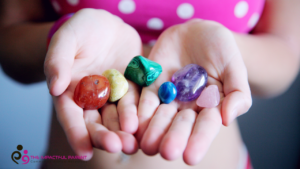Is my child a hoarder? If you are concerned that your child’s collections are getting out of hand, then this episode is for YOU! Kristina, the founder of The Impactful Parent, talks about the signs of hoarding, why your child might be hoarding, and 5 things parents can do today to help their child.
Watch the Video below
LINKS MENTIONED IN THE RECORDING
Is My Child A Hoarder?
https://theimpactfulparent.com for more FREE Resources and paid programs.
https://theimpactfulparent.passion.io/
https://apps.apple.com/app/impactful-parent/id1601274505
https://play.google.com/store/apps/details?id=com.prmto733iicm.ptt70cx5app
to download the FREE Impactful Parent App. Freebies included.
TRANSCRIPT
Is My Child A Hoarder?
Welcome Impactful Parents. Today we are going to talk about hoarding in your school-aged child.
Hello, my name is Kristina Campos. I am the founder of the Impactful Parent. Every week I come on and answer one of your questions LIVE. If you have a question for next week, please submit it at theimpactfulparent@gmail.com or by messaging me on social media. All submissions are kept anonymous.

Is My Child A Hoarder?
Today’s question reads: I have concerns that my child might be becoming a hoarder? He won’t let me throw anything away and seems to be collecting more junk every single day. Why is my child doing this?
Thank you for submitting this question! Today I will tell you the signs of hoarding, why your child might be hoarding, and stick around to the end because I am giving you 5 tips for WHAT YOU SHOULD BE DOING RIGHT NOW to be a more impactful parent. Let’s get started!
It is normal for children to have a messy room or collect things. But your child shouldn’t get hysterical if you throw away old pizza boxes or socks with holes. Is your child extremely attached to things that seem worthless? Are they collecting what seems like random objects, and it’s getting out of control? Or are they very upset by even the idea of getting rid of things they don’t use and don’t seem to have value to you- then your child might be developing a mental illness called hoarding.
Hoarding is sometimes seen in kids as young as 6 years old. Kids who hoard have persistent difficulties letting go of items. They will fill up their rooms with what seems like junk, even to the point where normal functioning in the room is difficult. Children who hoard will develop extreme anxiety about losing their possessions. If their parent tries to clean up or throw away their “trash,” these kids may throw a tantrum, cry uncontrollably, or even become violent.
Sometimes, children who hoard don’t understand why they are doing it. This is different from other children who will be proud to show off their collections. However, hoarders will acquire compulsively, save everything, may even be embarrassed to show people their collections, and their items may feel unorganized to an outsider looking at their stuff. The items your child is collecting might seem “useless” or even “trash.” They may not have space in their room for the items they are collecting, but it doesn’t matter to the child. And kids that hoard tend to pick up and pocket things they see on the street like coins, sticks, rocks, pinecones, etc.
Why would your child be doing this? Well, hoarders have a different pattern of thought. They could be hoarding because they fear something bad will happen if they throw their collectibles away. They may feel a sense of security and comfort by having their collection. Some kids feel a strong sense of “It is important not to waste,” so they keep their items. Other kids will associate their items with memory and feel that the memory will be gone if they throw the item away. They may say something like, “This rock reminds me of the time you took me to play basketball.” They feel like throwing the rock away will also throw away the memory. Some children who hoard believe that their items have feelings. They feel guilty if they discard the items away. For example, you may hear a child say, “I can’t put my rock in the closet. My rock might get scared of the dark or feel alone.” To them, their possessions are like loved ones. They don’t see their stuff any different than a family pet or even a sibling.

Is My Child A Hoarder?
Most children who develop hoarding at a young age (before adolescence) also have Obsessive Compulsive Disorder. Hoarding is related to OCD, but unlike OCD, kids are not hoarding to relieve anxiety. Hoarders collect because they think the item is cool, unique, they really want it, or they feel it could help them somehow. Anxiety only onsets when someone tries to get rid of their items or touches them without permission. For more information on OCD, you can watch my video on Obsessive-Compulsive Disorder.
So what should you do if you have a child who is hoarding? Well, just as important as what you should do, let’s first talk about what you should NOT do.
- Parents should NOT just clean up or throw away the child’s possessions. Why? The only thing this does is put a lot of stress on the child, making the problem worse. Your child will see you as a threat and not their ally. They will distrust you and become even more attached to their items. Even worse, children who don’t trust their parents will likely refuse their help in the future, and this means they won’t want to get professional help either. To get your child to stop hoarding, parents must treat the underlying issues and not just force change by taking matters into their own hands.
- It is also important for parents not to cast judgment openly upon their children. You may think that their possession and obsessions are ridiculous, but you can’t show this to your child. Watch what kind of language you use to talk about their items. Don’t devalue their possessions, touch them without permission, or threaten to take away their stuff.
Is My Child A Hoarder?
What can parents do?
- Get your child officially diagnosed by a doctor and find a children’s therapist. Your therapist will likely work with your child through cognitive behavior therapy and exposure therapy. This entails working with how your child is thinking and, little by little, asking your child to practice letting go of their cherished items. Kids will also learn how to manage the anxiety during their “letting go” process.
- Also, empathize with your child’s feelings. Encourage them to let go by rewarding behaviors you want to see and any child’s efforts to let go of their items. Be your child’s biggest fan because you don’t want a ME versus YOU scenario in your home. Instead, you want to create a home culture of US against the PROBLEM.
- And lastly, ask your child’s permission before you throw out their possessions or move them around.
And if you have a question you want to submit for me to answer live, please do! Submit your questions by DM or email at theimpactfulparent@gmail.com. Plus- if you want to become a more Impactful Parent, check out all that my website has to offer! I have parenting courses, family coaching, a free downloadable app, and many free resources. But until next time, you got this, parents. I am just here to help.
-
What to do next:
1. Get The Impactful Parent App! Everything you need in your parenting journey in one spot! Available on the Android Play Store and the Apple Store. Search Impactful Parent (direct links listed above under Links in Episode).
2. Follow The Impactful Parent on social media if you don’t already! Facebook, Instagram, LinkedIn, & Pinterest
4. Check out the official website of The Impactful Parent for FREE RESOURCES, parenting classes, mom’s groups, and so much more! Click here to check it out!
5. Discover how you can work with Kristina! Sign up for a FREE 30-minute discovery call! Click here to find a time that works best for you!
Bottom Line… I am here for YOU! Contact me at theimpactfulparent@gmail.com
It takes a lot to run a household! Here are a few products I USE and recommend:
Gabb Wireless: The BEST first phone for your child!
- No internet, no social media, and NO WORRIES! This phone has GPS tracking and other features that parents want to have peace of mind about their child having a phone. The Gabb Wireless phone has the sleek look of a smartphone that kids love without worry and high price. To find out more and order your phone (or watch) go to: gabbwireless.com/promo/IMPACTFULPARENT30


